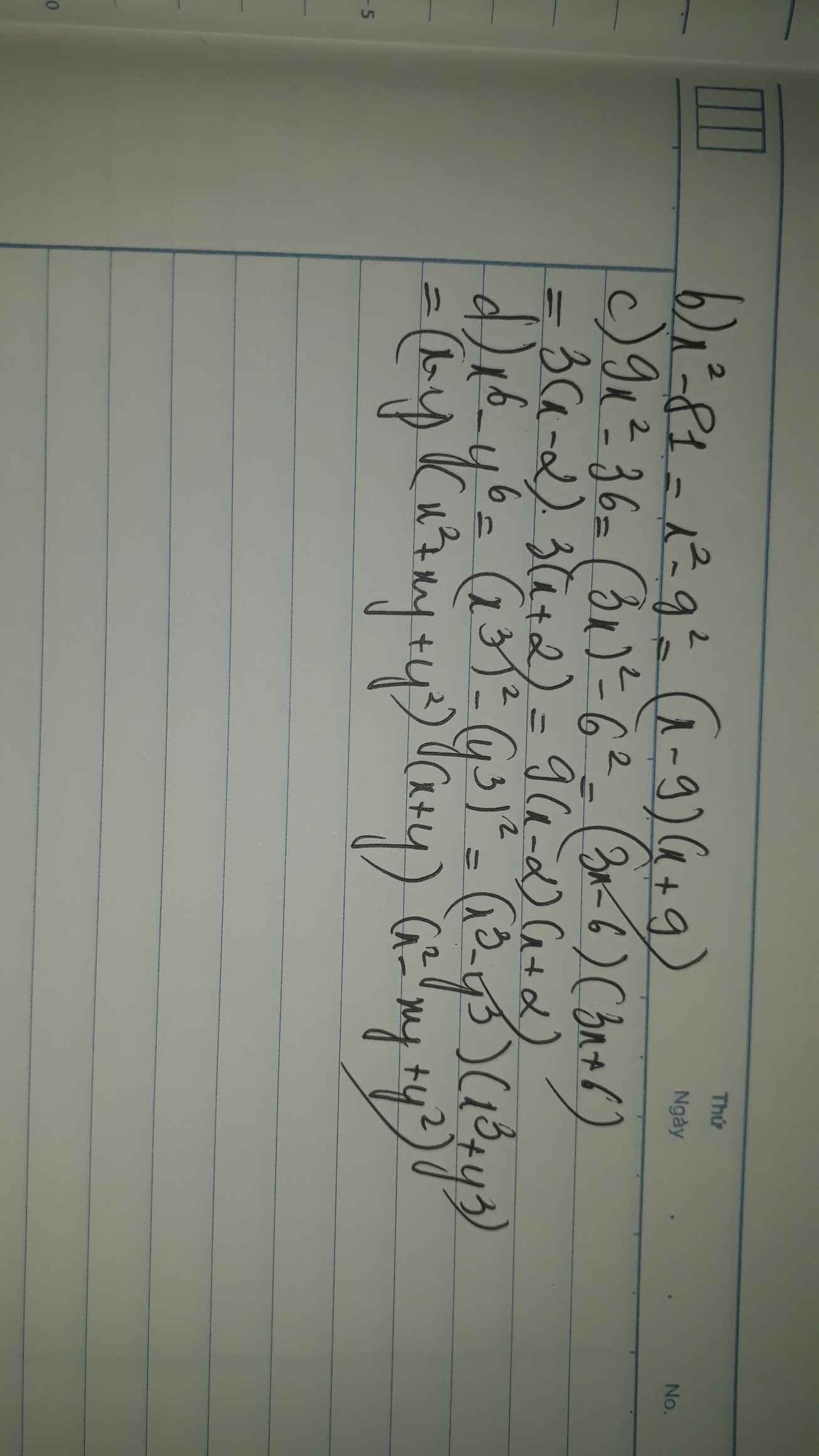Phân tích các đa thức sau thành nhân tử:
\(x^6+y^6\)
\(0.04-9x^2\)
\(32x^2-2\left(y-1\right)^2\)
Phân tích các đa thức sau thành nhân tử:
\(\left(4x-1\right)^2-121\)
\(x^6-y^6\)
`#3107.101107`
`(4x - 1)^2 - 121`
`= (4x - 1)^2 - (11)^2`
`= (4x - 1 - 11)(4x - 1 + 11)`
`= (4x - 12)(4x + 10)`
`= 4(x - 3) * 2(2x + 5)`
`= 8(x - 3)(2x + 5)`
_____
`x^6 - y^6`
`= (x^3)^2 - (y^3)^2`
`= (x^3 - y^3)(x^3 + y^3)`
`= (x - y)(x^2 + xy + y^2)(x + y)(x^2 - xy + y^2)`
`= (x - y)(x + y)(x^2 + xy + y^2)`
____
Sử dụng các HĐT:
`@` `A^2 - B^2 = (A - B)(A + B)`
`@` `A^3 - B^3 = (A - B)(A^2 + AB + B^2)`
`@` `A^3 + B^3 = (A + B)(A^2 - AB + B^2).`
a: \(\left(4x-1\right)^2-121\)
\(=\left(4x-1\right)^2-11^2\)
\(=\left(4x-1-11\right)\left(4x-1+11\right)\)
\(=\left(4x-12\right)\left(4x+10\right)\)
\(=8\left(x-3\right)\left(2x+5\right)\)
b: \(x^6-y^6\)
\(=\left(x^3-y^3\right)\left(x^3+y^3\right)\)
\(=\left(x-y\right)\left(x^2+xy+y^2\right)\left(x+y\right)\left(x^2-xy+y^2\right)\)
Phân tích các đa thức sau thành nhân tử: \(\left(x^2+2x\right)^2+9x^2+18x+20\)
\(\left(x^2+2x\right)^2+4\left(x^2+2x\right)+5\left(x^2+2x\right)+20\)
\(=\left(x^2+2x\right)\left(x^2+2x+4\right)+5\left(x^2+2x+4\right)\)
\(=\left(x^2+2x+5\right)\left(x^2+2x+4\right)\)
(x2+2x)+9x2+18x+20
=(x2+2x)+9(x2+2x)+20
Đặt t=x2+2x đc:
t+9t+20=10t+20=10(t+2)
Thay t=x2+2x vào đc:
10(x2+2x+2)
phân tích các đa thức sau thành nhân tử:
a)x^2-4y^2+4xy
b)x^2-81
c)9x^2-36
d)x^6-y^6

Bài a thì bạn thử xem lại đề nhé.
Phân tích đa thức thành nhân tử
\(27x^3-\dfrac{1}{8}y^3\)
a. \(\left(3x-\dfrac{1}{2}y\right)\left(9x^2+\dfrac{3}{2}xy+\dfrac{1}{4}x^2\right)\)
b. \(\dfrac{1}{8}\left(216x^3-y^3\right)=\dfrac{1}{8}\left(6x-y\right)\left(36x^2+6xy+y^2\right)\)
cách phân tích nào đúng a hay b giải thích vì sao
Bài 1: Phân tích đa thức sau thànBài 1: Phân tích đa thức sau thành nhân tử a) x 2 – xy + x – y b) x 2 + 5x + 6 c) 2xy - x 2 - y 2 +16h nhân tử a) x 2 – xy + x – y b) x 2 + 5x + 6 c) 2xy - x 2 - y 2 +16
a) \(x^2-xy+x-y\)
\(=x\left(x-y\right)+\left(x-y\right)\)
\(=\left(x+1\right)\left(x-y\right)\)
b) \(x^2+5x+6\)
\(=x^2+2x+3x+6\)
\(=x\left(x+2\right)+3\left(x+2\right)\)
\(=\left(x+3\right)\left(x+2\right)\)
\(2xy-x^2-y^2+16\)
\(=16-\left(x-y\right)^2\)
\(=\left(4-x+y\right)\left(4+x-y\right)\)
Phân tích đa thức thành nhân tử (x-1)(x+2)(x+3)(x-6)+32x^2
Ta có:
\(\left(x-1\right)\left(x+2\right)\left(x+3\right)\left(x-6\right)+32x^2\)
\(=\left(x^2-7x+6\right)\left(x^2+5x+6\right)+32x^2\)
Đặt : \(x^2+6=a\left(a< 0\right)\). Khi đó pt trở thành:
\(\left(a-7x\right)\left(a+5x\right)+32x^2\)
\(=a^2-2ax-3x^2=\left(a+x\right)\left(a-3x\right)\)
\(=\left(x^2+x+6\right)\left(x^2-3x+6\right)\)
Bài 1: Phân tích đa thức thành nhân tử:
1) \(3x^3y^2-6xy\)
2) \(\left(x-2y\right).\left(x+3y\right)-2.\left(x-2y\right)\)
3) \(\left(3x-1\right).\left(x-2y\right)-5x.\left(2y-x\right)\)
4) \(x^2-y^2-6y-9\)
5) \(\left(3x-y\right)^2-4y^2\)
6) \(4x^2-9y^2-4x+1\)
8) \(x^2y-xy^2-2x+2y\)
9) \(x^2-y^2-2x+2y\)
Bài 2: Tìm x:
1) \(\left(2x-1\right)^2-4.\left(2x-1\right)=0\)
2) \(9x^3-x=0\)
3) \(\left(3-2x\right)^2-2.\left(2x-3\right)=0\)
4) \(\left(2x-5\right)\left(x+5\right)-10x+25=0\)
Bài 2:
1: \(\left(2x-1\right)^2-4\left(2x-1\right)=0\)
=>\(\left(2x-1\right)\left(2x-1-4\right)=0\)
=>(2x-1)(2x-5)=0
=>\(\left[{}\begin{matrix}2x-1=0\\2x-5=0\end{matrix}\right.\Leftrightarrow\left[{}\begin{matrix}x=\dfrac{1}{2}\\x=\dfrac{5}{2}\end{matrix}\right.\)
2: \(9x^3-x=0\)
=>\(x\left(9x^2-1\right)=0\)
=>x(3x-1)(3x+1)=0
=>\(\left[{}\begin{matrix}x=0\\3x-1=0\\3x+1=0\end{matrix}\right.\Leftrightarrow\left[{}\begin{matrix}x=0\\x=\dfrac{1}{3}\\x=-\dfrac{1}{3}\end{matrix}\right.\)
3: \(\left(3-2x\right)^2-2\left(2x-3\right)=0\)
=>\(\left(2x-3\right)^2-2\left(2x-3\right)=0\)
=>(2x-3)(2x-3-2)=0
=>(2x-3)(2x-5)=0
=>\(\left[{}\begin{matrix}2x-3=0\\2x-5=0\end{matrix}\right.\Leftrightarrow\left[{}\begin{matrix}x=\dfrac{3}{2}\\x=\dfrac{5}{2}\end{matrix}\right.\)
4: \(\left(2x-5\right)\left(x+5\right)-10x+25=0\)
=>\(2x^2+10x-5x-25-10x+25=0\)
=>\(2x^2-5x=0\)
=>\(x\left(2x-5\right)=0\)
=>\(\left[{}\begin{matrix}x=0\\2x-5=0\end{matrix}\right.\Leftrightarrow\left[{}\begin{matrix}x=0\\x=\dfrac{5}{2}\end{matrix}\right.\)
Bài 1:
1: \(3x^3y^2-6xy\)
\(=3xy\cdot x^2y-3xy\cdot2\)
\(=3xy\left(x^2y-2\right)\)
2: \(\left(x-2y\right)\left(x+3y\right)-2\left(x-2y\right)\)
\(=\left(x-2y\right)\cdot\left(x+3y\right)-2\cdot\left(x-2y\right)\)
\(=\left(x-2y\right)\left(x+3y-2\right)\)
3: \(\left(3x-1\right)\left(x-2y\right)-5x\left(2y-x\right)\)
\(=\left(3x-1\right)\left(x-2y\right)+5x\left(x-2y\right)\)
\(=(x-2y)(3x-1+5x)\)
\(=\left(x-2y\right)\left(8x-1\right)\)
4: \(x^2-y^2-6y-9\)
\(=x^2-\left(y^2+6y+9\right)\)
\(=x^2-\left(y+3\right)^2\)
\(=\left(x-y-3\right)\left(x+y+3\right)\)
5: \(\left(3x-y\right)^2-4y^2\)
\(=\left(3x-y\right)^2-\left(2y\right)^2\)
\(=\left(3x-y-2y\right)\left(3x-y+2y\right)\)
\(=\left(3x-3y\right)\left(3x+y\right)\)
\(=3\left(x-y\right)\left(3x+y\right)\)
6: \(4x^2-9y^2-4x+1\)
\(=\left(4x^2-4x+1\right)-9y^2\)
\(=\left(2x-1\right)^2-\left(3y\right)^2\)
\(=\left(2x-1-3y\right)\left(2x-1+3y\right)\)
8: \(x^2y-xy^2-2x+2y\)
\(=xy\left(x-y\right)-2\left(x-y\right)\)
\(=\left(x-y\right)\left(xy-2\right)\)
9: \(x^2-y^2-2x+2y\)
\(=\left(x^2-y^2\right)-\left(2x-2y\right)\)
\(=\left(x-y\right)\left(x+y\right)-2\left(x-y\right)\)
\(=\left(x-y\right)\left(x+y-2\right)\)
Phân tích đa thức thành nhân tử:
\(\left(x+y\right)^2-\left(x+y\right)-6\)
(x+y)2-(x+y)-6
=(x+y)2+2.(x+y)-3.(x+y)-6
=(x+y)(x+y+2)-3.(x+y+2)
=(x+y+2)(x+y-3)
Phân tích đa thức thành nhân tử:
a. \(x^6-x^4-9x^3=9x^2\)
b. \(x^4+x^3+6x^2+5x+5\)
c. \(\left(12x^2-12xy+3y^2\right)-10\left(2x-y\right)+8\)